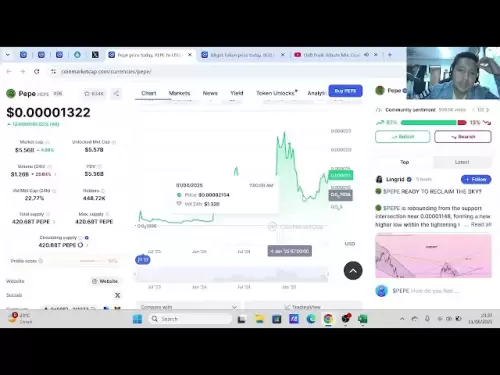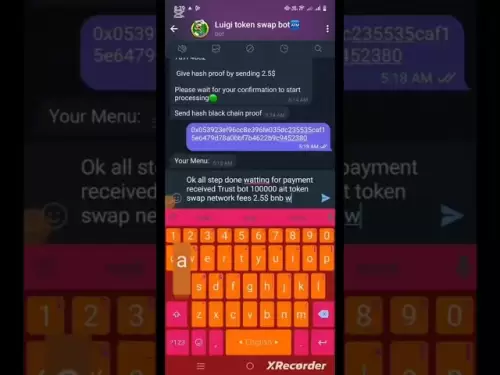-
 Bitcoin
Bitcoin $108,889.8084
-0.81% -
 Ethereum
Ethereum $2,820.7248
1.62% -
 Tether USDt
Tether USDt $1.0001
0.01% -
 XRP
XRP $2.2946
-0.26% -
 BNB
BNB $667.5348
0.01% -
 Solana
Solana $163.1955
-0.68% -
 USDC
USDC $0.9998
0.01% -
 Dogecoin
Dogecoin $0.1952
0.01% -
 TRON
TRON $0.2822
-3.29% -
 Cardano
Cardano $0.7056
-0.52% -
 Hyperliquid
Hyperliquid $42.3451
2.52% -
 Sui
Sui $3.4321
-0.90% -
 Chainlink
Chainlink $15.1702
-0.54% -
 Avalanche
Avalanche $21.8254
-2.44% -
 Stellar
Stellar $0.2791
0.06% -
 Bitcoin Cash
Bitcoin Cash $436.7091
0.31% -
 UNUS SED LEO
UNUS SED LEO $9.0234
3.09% -
 Toncoin
Toncoin $3.2576
-1.49% -
 Shiba Inu
Shiba Inu $0.0...01322
0.08% -
 Hedera
Hedera $0.1760
-2.66% -
 Litecoin
Litecoin $92.2057
0.26% -
 Polkadot
Polkadot $4.2486
-0.88% -
 Monero
Monero $326.1263
-4.20% -
 Ethena USDe
Ethena USDe $1.0006
0.00% -
 Bitget Token
Bitget Token $4.8236
0.40% -
 Pepe
Pepe $0.0...01278
-1.09% -
 Dai
Dai $0.9998
0.01% -
 Uniswap
Uniswap $8.0639
-3.53% -
 Pi
Pi $0.6359
-1.17% -
 Aave
Aave $307.7143
0.18%
How to use the API of Gemini contracts? What permissions do I need to apply for?
To use Gemini Contracts API, register for a Gemini account, apply for specific permissions, set up your development environment, and handle authentication securely.
May 04, 2025 at 11:21 am
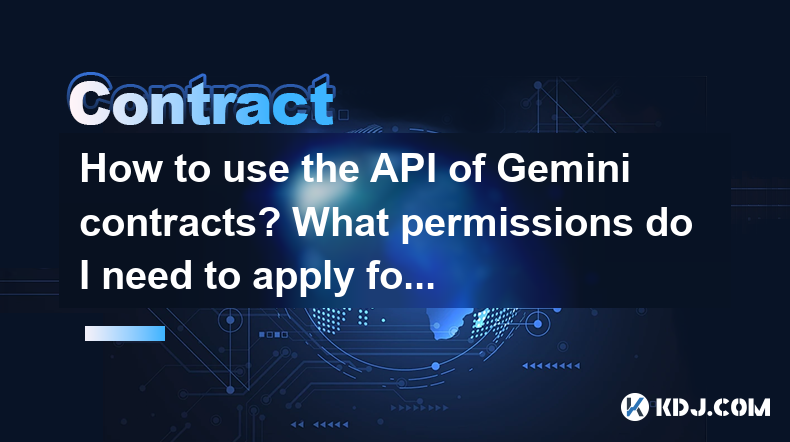
Using the API of Gemini contracts involves several steps and requires specific permissions. This guide will walk you through the process of setting up and utilizing the Gemini contracts API, as well as the permissions you need to apply for.
Understanding Gemini Contracts API
Gemini Contracts API is a powerful tool that allows developers to interact with Gemini's trading platform programmatically. This API enables users to execute trades, retrieve market data, manage orders, and more, all through automated processes. It is essential for those looking to develop trading bots, perform high-frequency trading, or integrate Gemini's services into their applications.
Registering for a Gemini Account
Before you can use the Gemini Contracts API, you need to have a Gemini account. Here's how you can register:
- Visit the Gemini website and click on the "Sign Up" button.
- Fill in your personal information, including your name, email address, and a strong password.
- Complete the identity verification process, which may require submitting identification documents.
- Once your account is verified, you can proceed to apply for API access.
Applying for API Permissions
To use the Gemini Contracts API, you must apply for specific permissions. Here's what you need to do:
- Log into your Gemini account.
- Navigate to the "API" section in the account settings.
- Click on "Create New API Key."
- Select the permissions you need. For the Contracts API, you will typically need:
- Read permission to access market data and account information.
- Trade permission to execute orders and manage trades.
- Funds permission to manage deposits and withdrawals.
- After selecting your permissions, you will be prompted to set up an API key and a secret key. Keep these secure as they will be used to authenticate your API requests.
Setting Up Your Development Environment
Once you have your API keys, you need to set up your development environment. Here's how to do it:
- Choose a programming language that supports HTTP requests. Popular choices include Python, JavaScript, and Java.
- Install any necessary libraries or SDKs. For example, if you're using Python, you might install the
requestslibrary to handle HTTP requests. - Set up a secure way to store your API keys, such as using environment variables or a secure configuration file.
Making API Requests
With your environment set up, you can start making API requests. Here's a basic example of how to retrieve market data using Python:
Import the necessary libraries:
import requests
import jsonSet up your API keys:
api_key = 'your_api_key'
api_secret = 'your_api_secret'Define the endpoint you want to use. For example, to get the current ticker:
endpoint = 'https://api.gemini.com/v1/pubticker/btcusd'Make the request:
response = requests.get(endpoint)
data = response.json()
print(data)
This will return the current ticker data for BTC/USD. You can use similar methods to execute trades, manage orders, and access other features of the Gemini Contracts API.
Handling Authentication
Most API requests to the Gemini Contracts API require authentication. Here's how to authenticate your requests:
- Generate a nonce (a unique number used once) to prevent replay attacks.
- Create a payload containing the request details and the nonce.
- Use your API secret to create a signature of the payload.
- Include the API key, nonce, and signature in the headers of your request.
Here's an example in Python:
import time
import hmac
import hashlib
import base64
import requestsapi_key = 'your_api_key'
api_secret = 'your_api_secret'
Generate a nonce
nonce = int(time.time() * 1000)
Define the payload
payload = {
'request': '/v1/order/new',
'nonce': nonce,
'symbol': 'btcusd',
'amount': '5',
'price': '35000',
'side': 'buy',
'type': 'exchange limit'
}
Create the signature
encoded_payload = json.dumps(payload).encode()
signature = hmac.new(api_secret.encode(), encoded_payload, hashlib.sha384).hexdigest()
Set up the headers
headers = {
'Content-Type': 'text/plain',
'X-GEMINI-APIKEY': api_key,
'X-GEMINI-PAYLOAD': base64.b64encode(encoded_payload).decode(),
'X-GEMINI-SIGNATURE': signature
}
Make the request
response = requests.post('https://api.gemini.com/v1/order/new', headers=headers, data=encoded_payload)
print(response.json())
Managing Orders and Trades
Once you've set up your API access and authenticated your requests, you can manage orders and trades. Here are some common operations:
- Placing an Order: Use the
/v1/order/newendpoint to place a new order. You'll need to specify the symbol, amount, price, side (buy or sell), and order type. - Canceling an Order: Use the
/v1/order/cancelendpoint to cancel an existing order. You'll need to provide the order ID. - Retrieving Order Status: Use the
/v1/order/statusendpoint to check the status of an order. You'll need to provide the order ID.
Error Handling and Best Practices
When using the Gemini Contracts API, it's important to handle errors and follow best practices:
- Error Handling: Always check the response status code and handle errors gracefully. For example, if a request fails, you might want to retry it after a short delay.
- Rate Limiting: Be aware of Gemini's rate limits to avoid having your API access suspended. If you exceed the rate limit, you'll receive a 429 status code.
- Security: Keep your API keys secure and never share them. Use HTTPS for all API requests to ensure data is encrypted in transit.
Frequently Asked Questions
Q: Can I use the Gemini Contracts API for automated trading?
Yes, the Gemini Contracts API is designed for automated trading. You can use it to place orders, manage trades, and retrieve market data programmatically.
Q: How often can I make API requests to Gemini?
Gemini has rate limits in place to prevent abuse. The exact limits can vary, but you can typically make a few requests per second. If you exceed the rate limit, you'll receive a 429 status code.
Q: Is there a cost associated with using the Gemini Contracts API?
There is no direct cost for using the Gemini Contracts API, but you will incur trading fees based on your trading activity. Be sure to review Gemini's fee schedule to understand the costs involved.
Q: Can I use the Gemini Contracts API to manage my funds?
Yes, with the appropriate permissions, you can use the Gemini Contracts API to manage your funds, including depositing and withdrawing assets.
Disclaimer:info@kdj.com
The information provided is not trading advice. kdj.com does not assume any responsibility for any investments made based on the information provided in this article. Cryptocurrencies are highly volatile and it is highly recommended that you invest with caution after thorough research!
If you believe that the content used on this website infringes your copyright, please contact us immediately (info@kdj.com) and we will delete it promptly.
- CFTC Announces Default Judgment Against Mark Gillespie and John Roche in My Big Coin Digital Asset Fraud Scheme
- 2025-06-12 03:14:16
- Kaia [KAIA], the native token of the merged Klaytn-Finschia network, surged over 20%
- 2025-06-12 03:12:15
- The Next Top Meme Coin in 2025 Isn't Just Hype, It's Reshaping the Reward, Growth, and Engagement of Meme Coins
- 2025-06-12 03:10:59
- Launch of QFSCOIN's Most Profitable Bitcoin Mining Service in 2025
- 2025-06-12 03:00:12
- The United States is on the brink of a new technological frontier
- 2025-06-12 03:00:12
- All Heart Piece Locations In The Legend Of Zelda: The Wind Waker
- 2025-06-12 02:56:52
Related knowledge
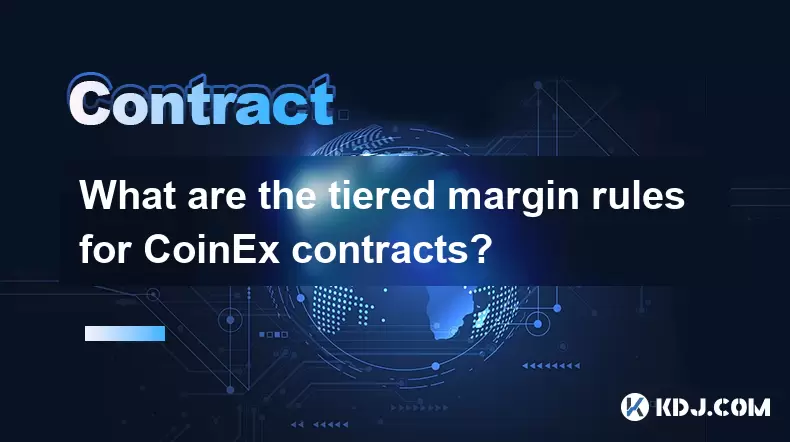
What are the tiered margin rules for CoinEx contracts?
Jun 11,2025 at 04:35pm
What are the Tiered Margin Rules for CoinEx Contracts?CoinEx, a well-known cryptocurrency exchange, offers a variety of derivative products, including futures contracts. One key aspect that traders must understand before engaging in leveraged trading is the tiered margin system. This system helps manage risk by adjusting the required maintenance margin ...
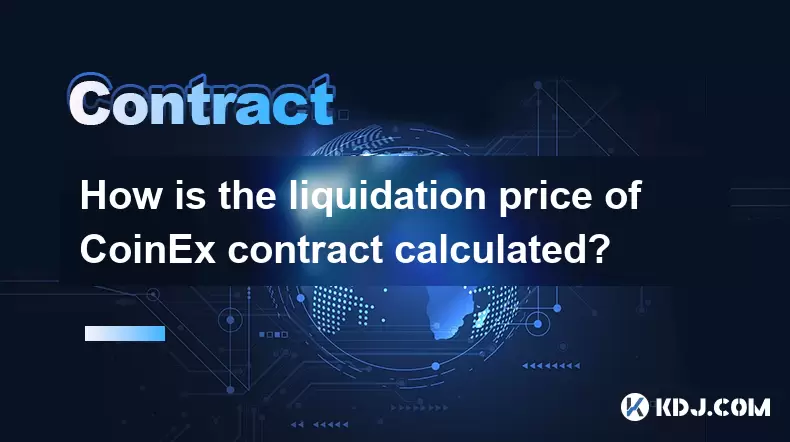
How is the liquidation price of CoinEx contract calculated?
Jun 11,2025 at 01:42am
Understanding the Basics of Liquidation Price in CoinEx ContractsThe liquidation price is a critical concept for traders engaging in futures contracts on platforms like CoinEx. It refers to the specific market price at which a trader’s position will be automatically closed by the system due to insufficient margin. This mechanism protects both the trader...
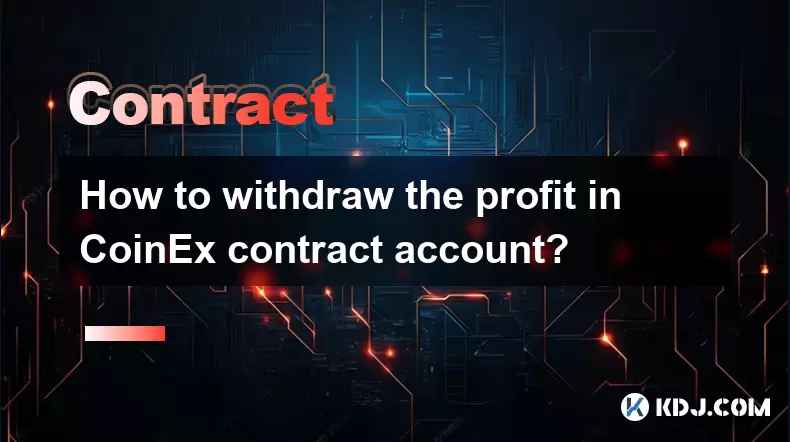
How to withdraw the profit in CoinEx contract account?
Jun 11,2025 at 05:29pm
Understanding CoinEx Contract AccountsTo effectively withdraw profits from a CoinEx contract account, it's essential to first understand what a contract account is. In the context of cryptocurrency derivatives trading, a contract account refers to a specialized wallet or balance segment used for holding funds allocated specifically for futures or perpet...
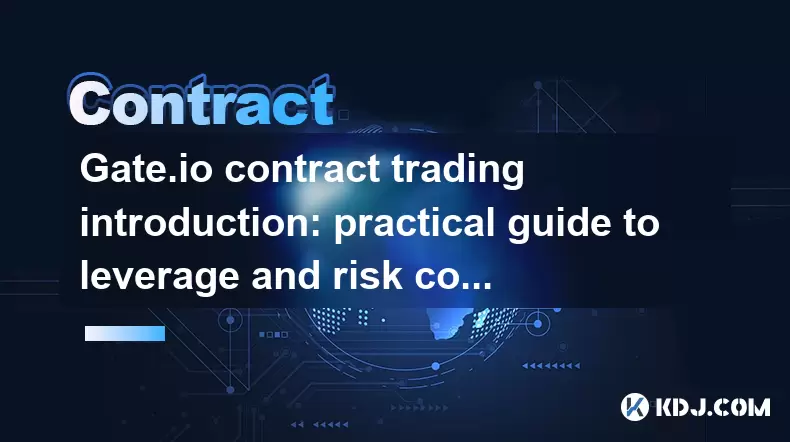
Gate.io contract trading introduction: practical guide to leverage and risk control
Jun 11,2025 at 02:08am
Understanding Gate.io Contract TradingGate.io is one of the leading cryptocurrency exchanges offering a wide range of trading options, including contract trading, also known as futures trading. This feature allows traders to speculate on the price movement of cryptocurrencies without owning the underlying asset. It's especially popular among experienced...
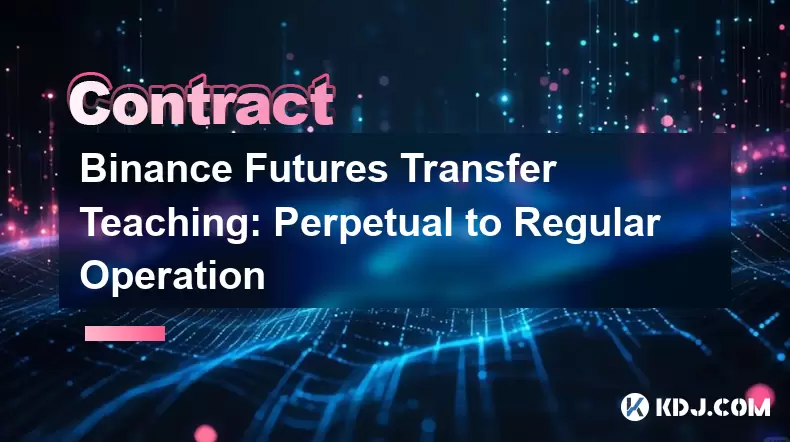
Binance Futures Transfer Teaching: Perpetual to Regular Operation
Jun 11,2025 at 08:42pm
Understanding Binance Futures Transfer MechanismThe Binance Futures platform allows users to trade both perpetual contracts and regular (delivery) futures contracts. While perpetual contracts have no expiration date, regular futures contracts are settled at a predetermined time. Transferring funds between these two types of contracts is essential for tr...
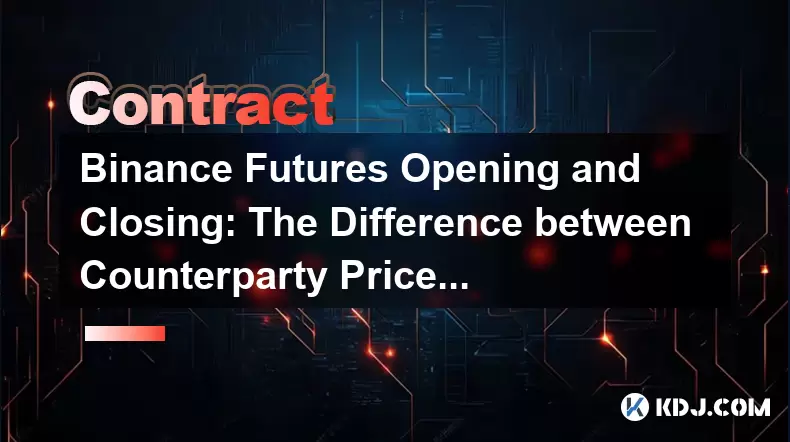
Binance Futures Opening and Closing: The Difference between Counterparty Price and Limit Price
Jun 10,2025 at 05:35am
What Is Binance Futures?Binance Futures is a popular trading platform that allows users to trade cryptocurrency futures contracts. These contracts enable traders to speculate on the future price of cryptocurrencies such as Bitcoin, Ethereum, and many others without actually owning the underlying asset. One of the key features of Binance Futures is its o...

What are the tiered margin rules for CoinEx contracts?
Jun 11,2025 at 04:35pm
What are the Tiered Margin Rules for CoinEx Contracts?CoinEx, a well-known cryptocurrency exchange, offers a variety of derivative products, including futures contracts. One key aspect that traders must understand before engaging in leveraged trading is the tiered margin system. This system helps manage risk by adjusting the required maintenance margin ...

How is the liquidation price of CoinEx contract calculated?
Jun 11,2025 at 01:42am
Understanding the Basics of Liquidation Price in CoinEx ContractsThe liquidation price is a critical concept for traders engaging in futures contracts on platforms like CoinEx. It refers to the specific market price at which a trader’s position will be automatically closed by the system due to insufficient margin. This mechanism protects both the trader...

How to withdraw the profit in CoinEx contract account?
Jun 11,2025 at 05:29pm
Understanding CoinEx Contract AccountsTo effectively withdraw profits from a CoinEx contract account, it's essential to first understand what a contract account is. In the context of cryptocurrency derivatives trading, a contract account refers to a specialized wallet or balance segment used for holding funds allocated specifically for futures or perpet...

Gate.io contract trading introduction: practical guide to leverage and risk control
Jun 11,2025 at 02:08am
Understanding Gate.io Contract TradingGate.io is one of the leading cryptocurrency exchanges offering a wide range of trading options, including contract trading, also known as futures trading. This feature allows traders to speculate on the price movement of cryptocurrencies without owning the underlying asset. It's especially popular among experienced...

Binance Futures Transfer Teaching: Perpetual to Regular Operation
Jun 11,2025 at 08:42pm
Understanding Binance Futures Transfer MechanismThe Binance Futures platform allows users to trade both perpetual contracts and regular (delivery) futures contracts. While perpetual contracts have no expiration date, regular futures contracts are settled at a predetermined time. Transferring funds between these two types of contracts is essential for tr...

Binance Futures Opening and Closing: The Difference between Counterparty Price and Limit Price
Jun 10,2025 at 05:35am
What Is Binance Futures?Binance Futures is a popular trading platform that allows users to trade cryptocurrency futures contracts. These contracts enable traders to speculate on the future price of cryptocurrencies such as Bitcoin, Ethereum, and many others without actually owning the underlying asset. One of the key features of Binance Futures is its o...
See all articles





















